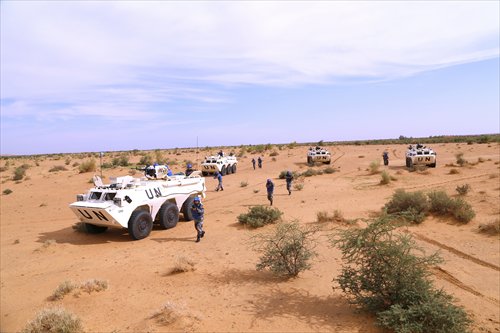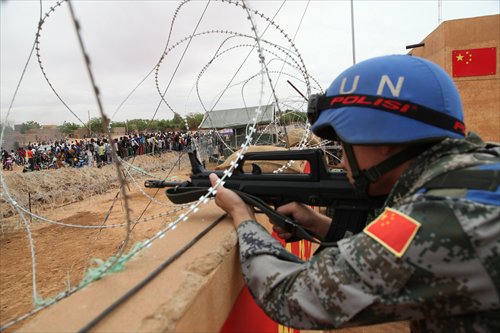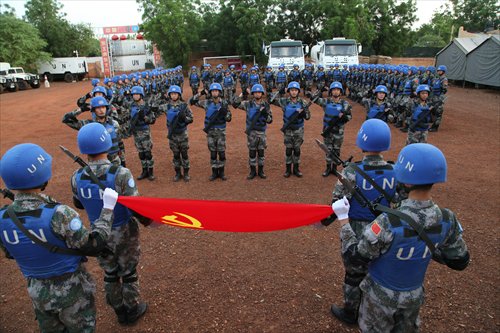Keeping peace in the Sahara
Chinese soldiers earn respect after a UN mission to Mali
The first batch of soldiers sent by China to serve on a UN peacekeeping mission returned from Mali after suffering zero casualties. Praised for their discipline, courage and efficiency, the group completed around 700 missions in the West African country. Blue UN helmets and the Chinese flag on their arms were their symbols; scorching heat, Saharan sands and the risk of combat were their day to day challenges. Some have seen this as signaling China's willingness to send its armed forces onto foreign battlefields and display its military power. Others have lauded China taking on the responsibility of international peacekeeping.

Chinese peacekeepers in Gao, northern Mali, conduct a drill in the desert on August 18. Photo: Liu Yuguo
One hundred and seventy soldiers, 50 degree heat, 10 months away from home and 700 individual missions to complete. This all adds up to one of the toughest deployments in recent Chinese military history, undertaken by the first batch of People's Liberation Army (PLA) soldiers sent on a UN peacekeeping operation in the war-torn West African country of Mali.
After handing over their duties to the second batch of Chinese troops sent to Mali, the first contingent returned home in September. They brought back with them not only UN Peace Medals of Honor, but also a sense of pride in the PLA's capability to achieve national defense and peacekeeping goals.
In 2012, an insurgency broke out in the landlocked country, which has a population of 14 million spread out across an area of 1.24 million square kilometers. After a military intervention from Mali's former colonial ruler, France, the rebels - a mix of extremists, jihadists and separatists - were forced into the country's northern hinterland.
To support the country's transitional authorities, the United Nations Multidimensional Integrated Stabilization Mission in Mali (MINUSMA) was established by Security Council resolution 2100 in April 2013.
At the UN's request, China sent a 395-strong peacekeeping force to Mali in December. For the first time, the PLA dispatched an armed force of 170 troops to work, together with engineers and healthcare workers. Previously, Chinese peacekeeping missions consisted only of medical staff, engineers and police personnel.
On September 25, Beijing announced it would send 700 troops to South Sudan as part of a peacekeeping mission.
Chinese commanders that were interviewed tried to downplay international worries over growing Chinese military power, saying that they believed that a more active PLA would have a positive impact on world peace.

A Chinese solider moves into a defensive position as hundreds of demonstrators gather before the UN peacekeeper's headquarters in Gao. Photos: Yang Huawen
Tradition of bravery
"Bringing them all back home safe, not losing anyone, is one of my biggest achievements," Zhang Geqiang, commander of the first Chinese peacekeeping force sent to Mali, proudly told the Global Times.
So far 43 peacekeeping personnel have been killed in Mali since the start of the UN mission. None were from China, according to UN statistics.
Zhang was the commander of the well-known Tiger Regiment under the Shenyang Military Area Command when he received the order to establish a force to defend the eastern headquarters of MINUSMA in the city of Gao, where about 3,000 peacekeeping personnel from over 40 countries were stationed.
The city is in Mali's north and located at the southern border of the Sahara Desert. During the day, the temperature can reach 60 degrees, and at night, mosquitoes are a constant nuisance. Sandstorms darken the sky and can even flip a car over. Gao, a strategically important stronghold, regularly faced rocket attacks and suicide bombs.
Despite the dangers and harsh conditions, Zhang received 2,030 application letters from soldiers who wanted to join the force. He was not surprised. "The Tiger Regiment was founded in 1928. It carries with it the spirit of the Red Army and its tradition of bravery," the 38-year-old commander said.
Yang Huawen, 28, joined the regiment in 2009 after graduating from the National University of Defense Technology. After learning of the opportunity to go to Mali, he married his fiancée in the morning and handed in his application letter in the afternoon.
"I have talked with several of my comrades, and we share similar ideas. We seized the chance to go to Mali not for personal honor, awards or higher pay, but because we believe in the mission. When the chance to go to a real battlefield came, none of us wanted to miss it. Otherwise, we'd bring shame to our uniform," Yang told the Global Times.

In Mali, several Chinese peacekeepers swear an oath while joining the Communist Party of China. Photo: Yang Huawen
Discipline on display
After intense training, the peacekeeping force flew to Mali from Harbin, capital of Northeast China's Heilongjiang Province, in early December.
After arriving at the MINUSMA headquarters in Gao, the troops started to build defensive installations and dormitories. Within two weeks, a Chinese camp - complete with lodgings, medical facilities and a surveillance system - was established.
Impressed by the discipline of the Chinese soldiers, the MINUSMA commander Jean Bosco Kazura wrote in his new year's greetings to the Chinese force that "we are proud to have you here. You are highly disciplined and capable."
The arrival of the Chinese unsettled some locals at the beginning. The village head Douhet, 88-year-old, led some villagers to the camp gate and demanded answers from a guard. 'What did you come here for? Will you heavily armed men hurt us?'
Twenty minutes later, Zhang went to Douhet's home, along with a translator and several other officers. He brought with him some peacekeeping publicity materials to help explain their mission and some insect repellents to give as gifts. Soon, during friendly dialogues, the villagers' worries were eased.
Liu Xiaoming, a platoon sergeant, said they had to be fully armed at all times - carrying a firearm, ammo, body armor and a first-aid kit. Soldiers on duty had to be able to block the camp's gate within 3 seconds and reach their defensive positions within 10 seconds.
"The enemy was dangerous and unpredictable. Apart from the rebels, there are other hostile forces in Mali that are skilled at guerilla warfare," said Zhang in October. "But we needed to be neutral. Our purpose was to control, not destroy the enemy. We needed to minimize the use of weapons." He compared the mission to a dance on a steel cable and a walk on a sharp knife.
Impartiality and avoiding the use of force, except for self-defense and the defense of the mandate, are the basic principles of peacekeeping.
The Malian authorities estimated there were about 500 terrorists hiding amongst civilians in Gao. It was a challenge for the peacekeepers to distinguish between refugees and suicide bombers.
To avoid ambushes, the Chinese force laid out more than 10 routes from the camp to Gao airport. They would switch between them randomly.
Due to their excellent performance, the PLA troops were also tasked with protecting a Dutch engineering company which was constructing a camp near the Gao airport, an area that had been the target of several attacks.
During their 300-day long mission in Mali, the PLA force undertook 697 patrol and escort missions and dealt with more than 60 protests, suicide attacks and explosions.
May 19 is a date that every soldier that was on the mission remembers clearly. At noon, the MINUSMA headquarters in Gao were surrounded by hundreds of furious civilians on motorcycles, holding sticks and knives, chanting slogans, and throwing stones and burning tires. Some of them carried guns.
As the security situation in northern Mali worsened after a renewed push south by the rebels, the Gao residents had panicked and were demanding the peacekeepers aggressively join the fight.
In this tense situation, a wrong move could have led to tragedy. Showing discipline, the soldiers took up their defensive positions and blocked the gate, despite stones falling like hail. Their defenses held firm and after a few hours the mob dispersed.
Welcoming the challenge
All of the PLA's equipment on this mission was domestically made and the product of Chinese research, from their rifles and their armor to their night vision goggles.
But they have not caught up with western troops yet. French troops have a visualization system in their helmets that provides them with data, said Sun Baowei, a communications officer that served with the Mali mission. Li Kaihua, who was the director of the PLA's medical unit said that a major difficulty facing Chinese troops is their poor grasp of foreign languages.
Zhang said that the mission offered a chance for PLA troops to display their courage, responsibility and their love of peace to the world, and he hopes that they will have more chances to do so in the future.
"It not only shows China to be a responsible nation, but also lets the world know that we are capable of fighting and winning wars. In this way, we can build our confidence and our right to speak out on international issues, and better defend our national interests," he said.
Since April 1990, the PLA has sent a total of 27,000 personnel on 24 operations, the most out of any of the five permanent members of the UN Security Council.
Some commentators have said that Beijing can get more "bang for its buck" by enlarging its presence on peacekeeping missions. But some worry that China taking on a "high-profile" role in peacekeeping operations would increase international concerns about the so-called China threat.
Song Zhongping, a military critic, said that such worries are baseless. "As unrest increases around the globe, UN peacekeeping operations face mounting pressure both in terms of funds and personnel. While some countries decline to step up, China welcomes the challenge, which deserves respect," Song told the Global Times.
"Peacekeeping is a double-edged sword, while our troops gain battle experience, we have to increase our military budget to support our forces, develop our military research and development and face the possibility of the loss of life and property," Song said. A total of 15 peacekeepers from China have died since 1990, including nine PLA soldiers.
Richard Gowan, an expert on EU security and UN peacekeeping operations at New York University, said China should not refrain from sending more troops on peacekeeping operations.
"China's approach to peacekeeping has been constructive but cautious to date, but the UN now faces growing threats in trouble-spots like South Sudan and Mali. China is responding to these threats by offering combat troops and the UN urgently needs this help," Gowan told the Global Times.
He said that Chinese troops are serving alongside Dutch and Nordic personnel and that this sort of co-deployment is a useful platform to promote Chinese military relationships with European nations.